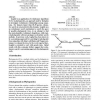Free Online Productivity Tools
i2Speak
i2Symbol
i2OCR
iTex2Img
iWeb2Print
iWeb2Shot
i2Type
iPdf2Split
iPdf2Merge
i2Bopomofo
i2Arabic
i2Style
i2Image
i2PDF
iLatex2Rtf
Sci2ools
139
click to vote
CEC
2003
IEEE
2003
IEEE
Phylogenetic trees using evolutionary search: initial progress in extending Gaphyl to work with genetic data
AbstractGaphyl is an application of evolutionary algorithms (EA's) to phylogenetics, an approach used by biologists to investigate evolutionary relationships among organisms. For datasets larger than 20-30 species, exhaustive search is not practical in this domain. Gaphyl uses an evolutionary search mechanism to search the space of possible phylogenetic trees, in an attempt to find the most plausible evolutionary hypotheses, while typical phylogenetic software packages use heuristic search methods. In previous work, Gaphyl has been shown to be a promising approach for searching for phylogentic trees using data with binary attributes and Wagner parsimony to evaluate the trees. In the work reported here, Gaphyl is extended to work with genetic data. Initial results with this extension further suggest that evolutionary search is a promising approach for phylogenetic work.
| Added | 23 Aug 2010 |
| Updated | 23 Aug 2010 |
| Type | Conference |
| Year | 2003 |
| Where | CEC |
| Authors | Clare Bates Congdon, Kevin J. Septor |
Comments (0)

